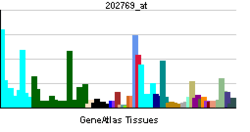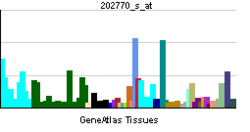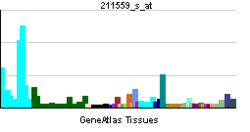CCNG2
| CCNG2 | ||||||
|---|---|---|---|---|---|---|
| Identifiers | ||||||
| Aliases | CCNG2 | |||||
| External IDs | MGI: 1095734 HomoloGene: 3208 GeneCards: CCNG2 | |||||
| RNA expression pattern | ||||||
   | ||||||
| More reference expression data | ||||||
| Orthologs | ||||||
| Species | Human | Mouse | ||||
| Entrez | ||||||
| Ensembl | ||||||
| UniProt | ||||||
| RefSeq (mRNA) | ||||||
| RefSeq (protein) | ||||||
| Location (UCSC) | Chr 4: 77.16 – 77.43 Mb | Chr 5: 93.27 – 93.28 Mb | ||||
| PubMed search | [1] | [2] | ||||
| Wikidata | ||||||
| View/Edit Human | View/Edit Mouse |
Cyclin-G2 is a protein that in humans is encoded by the CCNG2 gene.[3][4]
Function
The eukaryotic cell cycle is governed by cyclin-dependent protein kinases (CDKs) whose activities are regulated by cyclins and CDK inhibitors. The 8 species of cyclins reported in mammals, cyclins A through H, share a conserved amino acid sequence of about 90 residues called the cyclin box. The amino acid sequence of cyclin G is well conserved among mammals. The nucleotide sequence of cyclin G1 and cyclin G2 are 53% identical. Unlike cyclin G1, cyclin G2 contains a C-terminal PEST protein destabilization motif, suggesting that cyclin G2 expression is tightly regulated through the cell cycle.[4]
Interactions
CCNG2 has been shown to interact with PPP2CA.[5]
References
- ↑ "Human PubMed Reference:".
- ↑ "Mouse PubMed Reference:".
- ↑ Bates S, Rowan S, Vousden KH (Nov 1996). "Characterisation of human cyclin G1 and G2: DNA damage inducible genes". Oncogene. 13 (5): 1103–9. PMID 8806701.
- 1 2 "Entrez Gene: CCNG2 cyclin G2".
- ↑ Bennin DA, Don AS, Brake T, McKenzie JL, Rosenbaum H, Ortiz L, DePaoli-Roach AA, Horne MC (Jul 2002). "Cyclin G2 associates with protein phosphatase 2A catalytic and regulatory B' subunits in active complexes and induces nuclear aberrations and a G1/S phase cell cycle arrest". J. Biol. Chem. 277 (30): 27449–67. doi:10.1074/jbc.M111693200. PMID 11956189.
Further reading
- Horne MC, Goolsby GL, Donaldson KL, Tran D, Neubauer M, Wahl AF (1996). "Cyclin G1 and cyclin G2 comprise a new family of cyclins with contrasting tissue-specific and cell cycle-regulated expression". J. Biol. Chem. 271 (11): 6050–61. doi:10.1074/jbc.271.11.6050. PMID 8626390.
- Bennin DA, Don AS, Brake T, McKenzie JL, Rosenbaum H, Ortiz L, DePaoli-Roach AA, Horne MC (2002). "Cyclin G2 associates with protein phosphatase 2A catalytic and regulatory B' subunits in active complexes and induces nuclear aberrations and a G1/S phase cell cycle arrest". J. Biol. Chem. 277 (30): 27449–67. doi:10.1074/jbc.M111693200. PMID 11956189.
- Tian YL, Liu FR, Liu J, Jiang L, Luo Y, Zhang X (2002). "[Ectopic expression of cyclin G2 inhibits cell proliferation in HeLa cancer cell line]". Ai Zheng. 21 (6): 577–81. PMID 12452053.
- Rual JF, Venkatesan K, Hao T, Hirozane-Kishikawa T, Dricot A, Li N, Berriz GF, Gibbons FD, Dreze M, Ayivi-Guedehoussou N, Klitgord N, Simon C, Boxem M, Milstein S, Rosenberg J, Goldberg DS, Zhang LV, Wong SL, Franklin G, Li S, Albala JS, Lim J, Fraughton C, Llamosas E, Cevik S, Bex C, Lamesch P, Sikorski RS, Vandenhaute J, Zoghbi HY, Smolyar A, Bosak S, Sequerra R, Doucette-Stamm L, Cusick ME, Hill DE, Roth FP, Vidal M (2005). "Towards a proteome-scale map of the human protein-protein interaction network". Nature. 437 (7062): 1173–8. doi:10.1038/nature04209. PMID 16189514.
- Bergqvist M, Brattström D, Brodin D, Lindkvist A, Dahlman-Wright K, Dreilich M, Wagenius G, Paulsson-Karlsson Y (2006). "Genes associated with telomerase activity levels in esophageal carcinoma cell lines". Dis. Esophagus. 19 (1): 20–3. doi:10.1111/j.1442-2050.2006.00532.x. PMID 16364039.
- Stossi F, Likhite VS, Katzenellenbogen JA, Katzenellenbogen BS (2006). "Estrogen-occupied estrogen receptor represses cyclin G2 gene expression and recruits a repressor complex at the cyclin G2 promoter". J. Biol. Chem. 281 (24): 16272–8. doi:10.1074/jbc.M513405200. PMID 16608856.
- Arachchige Don AS, Dallapiazza RF, Bennin DA, Brake T, Cowan CE, Horne MC (2006). "Cyclin G2 is a centrosome-associated nucleocytoplasmic shuttling protein that influences microtubule stability and induces a p53-dependent cell cycle arrest". Exp. Cell Res. 312 (20): 4181–204. doi:10.1016/j.yexcr.2006.09.023. PMC 1862360
 . PMID 17123511.
. PMID 17123511.
This article is issued from Wikipedia - version of the 5/19/2016. The text is available under the Creative Commons Attribution/Share Alike but additional terms may apply for the media files.